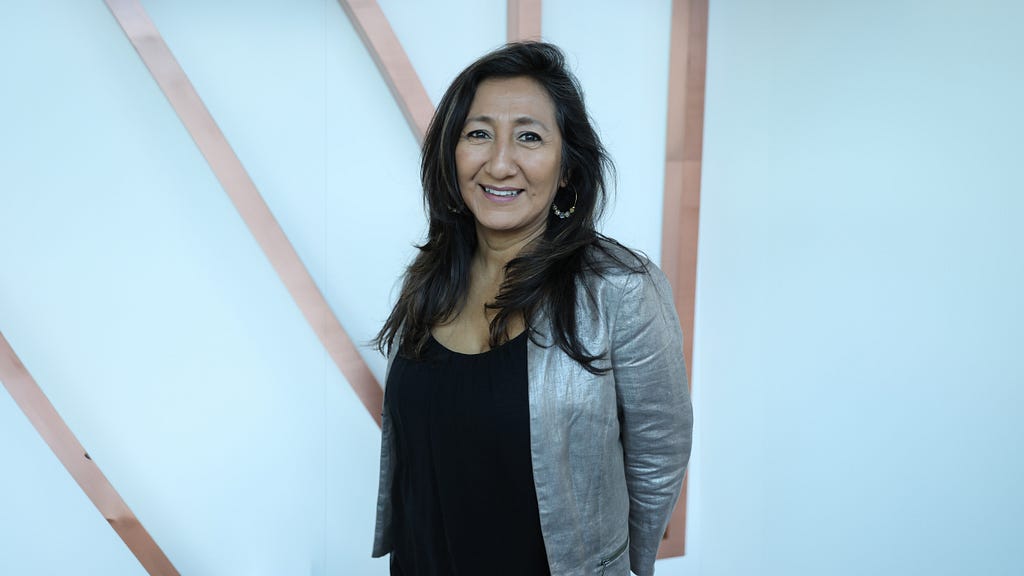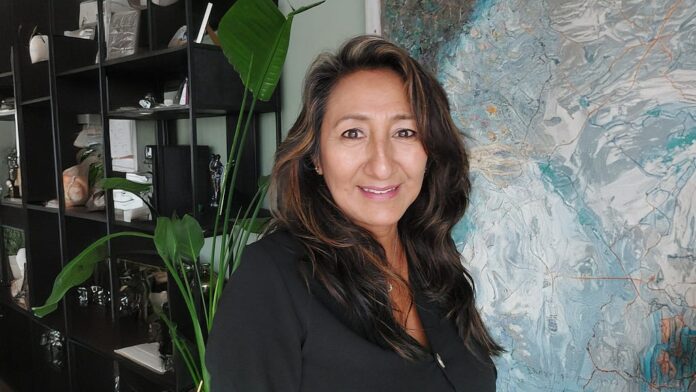Flor de Maria Paredes Mattos from Empowerment Foundation On An Inside Look at the Benefits and Impact Of Working With an Executive Coach
An Interview With Chad Silverstein
I have learned to understand where my deep limiting beliefs came from and how to get rid (control) of them. Whenever they try to appear, I start my affirmations by looking at myself in the mirror. This helps me stay positive.
The competitive edge in business often comes down to a combination of strategy, foresight, and professional development. For executives looking to level up their skills, an executive coach can be their biggest asset. In this feature, we talk to business leaders who heavily invest in personal and professional development opportunities, coaching, and leadership programs. They’ll share why they invest so much and the impact it has on their life. Today, I had the privilege of speaking with Flor de Maria Paredes Mattos.
Flor de Maria Paredes Mattos is an executive director of the Empowerment Foundation, which is dedicated to elevating overlooked communities into fulfilling careers and advocating for workplace equality.
With more than two decades of corporate experience, Flor is a sought-after advisor in professional development and business cultures. In addition to her organizational affiliations, Flor is an ICF-certified corporate and executive coach. She specializes in coaching executives on high-performance cultures, leadership behaviors, and career transitions.
With a successful tenure in the ICT sector, Flor demonstrates an ability to lead through change, career planning, and conflict resolution. Her clientele spans a range of industries, from university graduate students to senior operations managers, directors, and entrepreneurs, reflecting her versatility in coaching.
Her genuine interest in people and natural curiosity propel her mission to help clients realize their potential and utilize it to their advantage.
Thanks for being part of this series. Let’s jump in and focus on your early years. First off, can you give us a snapshot of your life before you started your career?
Well, I actually believe that I have had two careers: one as a corporate employee and the other as my current one, which is in corporate and executive coaching.
Before I set up my own business as a corporate and executive coach, I worked full-time for an international organization, where I enjoyed the people management part very much. Although the other part of my job was very interesting, as it was in technology, I felt happier when I was working with my team on how to improve ourselves and, as a result, how we can improve teamwork and get the best results for the organization’s goals.
I traveled a lot. I remember traveling to Taipei when I was almost six months pregnant. I could just do that, but once my second child was born, I was not so happy traveling too much anymore.
What was it about personal and professional development that attracted you to start investing in yourself? Also, can you share when you started and what your first investment was?
I remember my two team leads having issues working together. They were two very different, lovely girls. As much as I used my great management skills, I still could not resolve the issues myself. It was a very complicated situation. So my director suggested hiring a coach. It was then that I saw the coach in action and fell in love with coaching. I noticed that a lot of it I was doing already, and I liked doing it.
At that time, I was finding it increasingly difficult to travel, leaving my 7-year-old and 1-year-old at home with the nanny. So first, I decided to join a coaching training program in the UK, and after a year, I got my diploma. After the training, I realized even more that coaching is what I wanted to do the most. I was passionate about coaching my team and my colleagues, and even sometimes coaching my superiors.
My first investment was my coaching training. I not only learned what coaching is, but throughout the training, I was actually being coached myself.
The realization of leaving my full-time job and just focusing on my coaching came to mind very soon. However, due to my own limiting beliefs, I could not stop working full-time that easily. As any new sole entrepreneur feels when they start, I worried about many things.
Can you think back and share one of the biggest blind spots you had that someone helped you see and something specific about what you learned and how it showed up in your life?
A big blind spot a great coach helped me see was that, in addition to being a coach, I had great working experience in people management. It may sound silly, but then I did not see it. I later realized that the combination of being a passionate coach, my background in people management/corporate leadership, and my intercultural background was quite important to getting clients.
The realization that I could be a potential coach for many professionals removed my insecurities about setting up my own business. I started to leave who I was to prepare who I would be.
How long have you had an executive coach, and how would you describe your relationship?
I still have a coach. I see him maybe twice or three times a year. We have a great relationship, and as coaches, we continue learning. Every time I have a client, I learn something new. I love it.
If I was sitting down with your coach, and asked “what’s the one thing your client needs to work on more than anything else in the world” what would I hear them say about you?
My insecurity when dealing with something new — yes, I can be a bit insecure sometimes, and I am okay with it. It keeps me real and challenged.
If you were questioned about your “ROI” (return on investment), is there anything you can point to that justifies how much you spend on being coached? If not, how do you justify it?
I must say I have been very careful about further investing in my coaching. It’s only five years since my diploma that I worked on my first Coaching ICF certification, and by now, I have 2 ACC and PCC. I’m almost ready to start working on my MCC.
I have always believed that I first needed to make money from my coaching to spend it on my coaching. So far, that has worked for me.
Let’s dive into specifics. What are the top 5 things you’ve either gained or learned about yourself, where you specifically made changes, and have seen positive results. Be specific and feel free to give us either the background or story about each.
- I have learned to understand where my deep limiting beliefs came from and how to get rid (control) of them. Whenever they try to appear, I start my affirmations by looking at myself in the mirror. This helps me stay positive.
- I have learned to challenge myself with things I have never done before. I have a jar where I collect pieces of paper on which I write my achievements. Every now and then, I read them.
- I have gained/ created job satisfaction; I love what I do.
- I have learned that attitude is how we interact with each other and how we respond to what we hear. We may not like it, but we can influence our responses and ensure our attitude is open and positive.
- I have learned that I am the most important person in my life, and if I do not believe in myself, nobody will. If I promise myself something and I do not do it, the only person I am disappointing is myself.

What advice would you give other entrepreneurs who don’t think it’s worth investing in a coach or spending money to join a leadership program?
I believe that investing in yourself is the most important part, especially for entrepreneurs. Investing in training or in coaching to keep growing in your personal life and in your business is key. The more confident you feel and the more confident you present yourself, the more clients you will have.
If we have a coach who has not been a leader before and still wants to coach leaders, I would advise them to join a leadership program. To be successful in leadership coaching, you should at least understand and learn what it takes to be a leader and recognize leadership behaviors.
Do you have any examples of how being coached had an impact on others who work around you? How has it spilled over to your team or your family?
After becoming a coach, I noticed that I wanted to coach everyone I saw struggling. Soon, I realized that not everyone wants to be coached.
However, I now attract people who want to work on their personal development but may not have the finances to pay for a coach. That is one of the reasons why I said yes to co-founding the Empowerment Foundation. I realize now that I did not want to be around negativity or people who complained constantly.
My family and friends appreciate my positivity. My husband benefits from me as his coach, and my kids love how I can turn any challenge into an opportunity.
There are so many executive coaches out there. How did you go about selecting the right one for you?
That was easy. I had already met him before he became my coach. We kind of think alike, we understand each other. Some people say that there are so many coaches; why more? I believe that there are so many people, and not only one fits all.
Lastly, where can our audience go to follow your journey and perhaps get inspired to make their own investment in coaching?
You can visit my website and connect with me on LinkedIn. Also, check out Empowerment Foundation here!
Thank you so much for joining us! We wish you only success.
Flor de Maria Paredes Mattos from Empowerment Foundation On An Inside Look at the Benefits and… was originally published in Authority Magazine on Medium, where people are continuing the conversation by highlighting and responding to this story.


